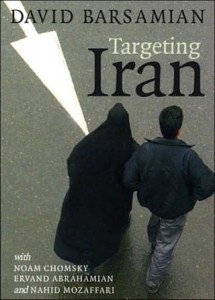 To many Americans, Iran’s history began with the 1979 hostage crisis. For Iranians, the pivotal date is 1953. That was the year a CIA-inspired coup killed their fledgling democracy and installed the shah as a puppet ruler. This pivotal difference in worldviews, argues David Barsamian, is what has led Iran and the United States to the brink of war. American foreign policy, built on misconceptions about a rogue nation run by blood-crazed mullahs and pulling the strings of groups like Hezbollah and Hamas, is becoming a self-fulfilling prophecy. Iran is portrayed as a fractured nation where radicals use every rattle of the American saber as an excuse to marginalize and even criminalize moderates and reformers.
To many Americans, Iran’s history began with the 1979 hostage crisis. For Iranians, the pivotal date is 1953. That was the year a CIA-inspired coup killed their fledgling democracy and installed the shah as a puppet ruler. This pivotal difference in worldviews, argues David Barsamian, is what has led Iran and the United States to the brink of war. American foreign policy, built on misconceptions about a rogue nation run by blood-crazed mullahs and pulling the strings of groups like Hezbollah and Hamas, is becoming a self-fulfilling prophecy. Iran is portrayed as a fractured nation where radicals use every rattle of the American saber as an excuse to marginalize and even criminalize moderates and reformers.
Barsamian has collected interviews with three experts on the region, each looking at it from a different perspective. His sometime-collaborator Noam Chomsky puts the Persian Gulf into a global context; Iranian-American academic Ervand Abrahamian dispels myths about Iran’s role in Muslim identity and regional politics; and Nahid Mozaffari, of free-speech advocates the PEN American Center, explores the clash between secular and religious life in the country described by neocons as a nation of barbarians.
These interviews catalog lost opportunities that could have brought Iran closer to America peacefully and headed off the rise of the reactionaries. Chomsky notes the potential to negotiate with moderates and pro-Western college students, but that there could be help from the most unexpected of sources: As Abrahamian points out, if the West wanted to derail any nuclear-bomb program, it could simply remind clerics that the Ayatollah Khomeini had declared such weapons un-Muslim and against the will of Allah.
It’s not a comprehensive primer to contemporary Iran. For that, readers should probably turn to Ray Takeyh’s Hidden Iran, whose cover not coincidentally carries a praising review from Abrahamian. Nor isTargeting Iran an apologia for the repressive regime in Tehran: All three, most especially human-rights activist Mozaffari, recall the brutalities heaped upon Iranians by their own government. Yet it suggests that an understanding between the two nations is far from impossible.